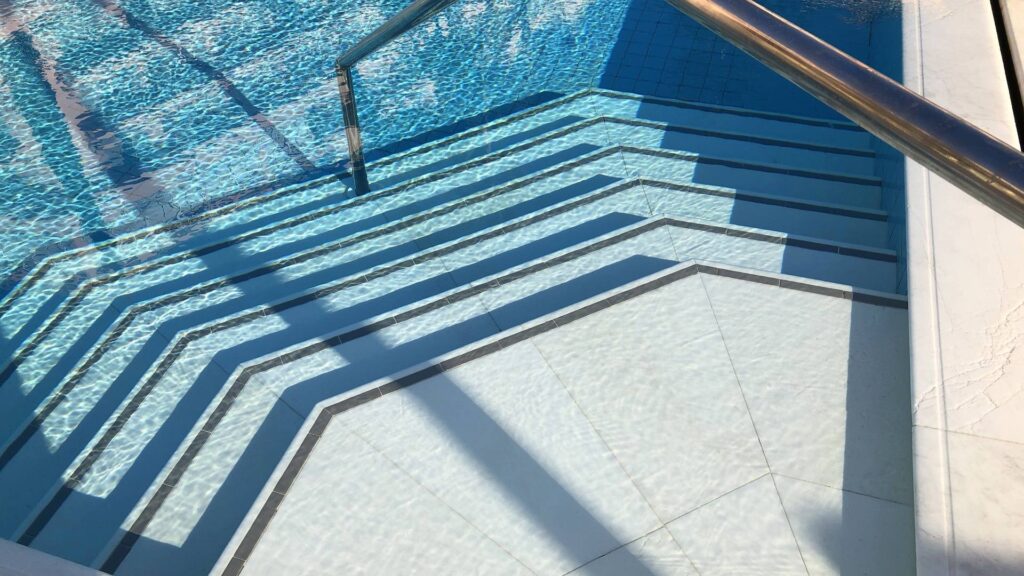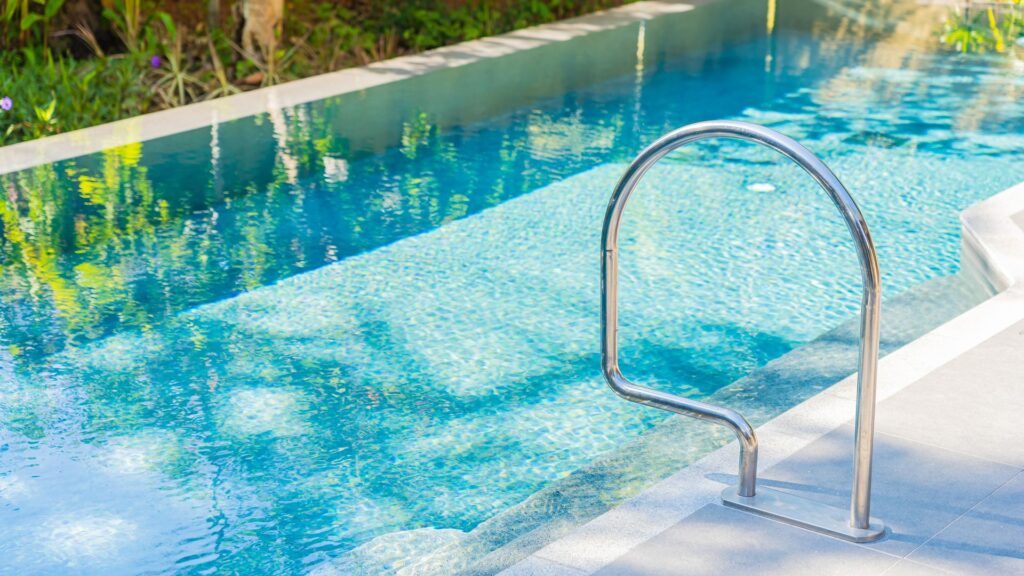A custom pool can transform your backyard into the ultimate sanctuary, offering endless hours of relaxation, fun, and family bonding—especially under the warm Georgia sun. However, many homeowners in the Atlanta area find the thought of funding such a project daunting. While paying in cash is ideal for some, it isn’t always feasible. That’s where financing comes in. By spreading payments over time, you can achieve the luxury of a custom pool without having to dip too deeply into your immediate savings.
In this guide, we’ll explore everything you need to know about financing a custom pool in Atlanta. We’ll discuss the typical cost range for new pools, various loan options, how to navigate the mortgage process, and budgeting tips to manage expenses. We’ll also provide a detailed look at the benefits of financing and ways to ensure you make the best financial decision for your household. Let’s dive in!
Understanding the Cost of a Custom Pool in Atlanta
Before delving into financing options, it’s crucial to have a realistic understanding of the costs associated with building a custom pool in Atlanta. Several factors come into play:
- Pool Type: Inground pools are generally more expensive than above-ground models. Within inground options, concrete tends to be pricier than fiberglass or vinyl, but it also offers greater longevity and customization potential.
- Size and Shape: Larger pools or those with complex shapes often carry higher material and labor costs.
- Add-On Features: Luxury elements like waterfalls, attached spas, custom lighting, and automation systems can significantly drive up the final price tag.
- Land Preparation: If your yard needs extensive grading or if you’re dealing with rocky soil, excavation costs may be higher.
- Permits and Inspections: In the city of Atlanta (and surrounding counties), permit fees vary. Confirm the exact requirements with local authorities.
- Landscaping: Don’t forget costs for decking, fencing, irrigation adjustments, and other landscaping upgrades you might need to integrate your new pool seamlessly into your backyard.
Typical Price Range
A basic inground pool in Atlanta can start around $40,000 to $50,000, while a more elaborate design with high-end materials and luxury features can exceed $100,000. Identifying a rough budget is the first step in deciding how to finance your custom pool.
Why Financing Can Be a Smart Choice
Some homeowners feel hesitant about taking on debt for a home improvement project. However, financing can be strategic and beneficial under the right circumstances:
- Preserving Cash Flow: Instead of liquidating savings or other assets, financing allows you to keep funds available for emergencies, investments, or other significant expenses.
- Boosting Home Value: A well-designed pool can increase your home’s market appeal in Atlanta’s competitive real estate environment. Spreading out payments over time means you invest gradually in something that may pay off if you decide to sell in the future.
- Enjoying the Pool Sooner: Instead of postponing your project for years while you save, financing enables you to enjoy the perks of a custom pool—health benefits, social entertainment, property value boost—right away.
- Potential Tax and Interest Advantages: Depending on the type of loan and your financial situation, certain interest payments might be tax-deductible. Always consult a tax professional to see if this applies to you.
Types of Financing Options for Your Custom Pool
Home Equity Loans (HEL)
A home equity loan allows you to borrow against the equity you’ve built up in your house—i.e., the current market value of your home minus any outstanding mortgage balance. With a HEL, you receive a lump sum up front and pay it back over a fixed term with a fixed interest rate.
- Pros
- Generally lower interest rates compared to unsecured loans.
- Predictable monthly payments due to a fixed rate.
- The interest might be tax-deductible under certain conditions.
- Cons
- Must have enough equity in your home to qualify.
- Using your home as collateral, so defaulting could lead to foreclosure.
- Closing costs and fees can be considerable.
Home Equity Line of Credit (HELOC)
A HELOC is another way to tap into your home’s equity, but instead of receiving a lump sum, you gain access to a credit line. You can draw funds as needed up to a set limit.
- Pros
- Flexible borrowing; pay interest only on what you use.
- Often lower initial interest rates than fixed loans.
- Can be used for ongoing projects and expenses, which is helpful if you decide to do landscaping or additional upgrades in stages.
- Cons
- Variable interest rates could lead to fluctuating monthly payments.
- Your home is still collateral, so there’s a risk if you default.
- Requires sufficient home equity.
Cash-Out Refinance
Cash-out refinancing replaces your current mortgage with a new, larger one. The difference between your old mortgage balance and the new one is disbursed to you in cash, which can be used for a pool.
- Pros
- Can lock in a potentially lower mortgage interest rate if market conditions are favorable.
- One monthly mortgage payment simplifies your finances.
- Interest may be tax-deductible if used for home improvements (consult a tax advisor).
- Cons
- Extends or resets the term of your mortgage, potentially increasing long-term interest costs.
- Involves closing costs similar to an original mortgage.
- Risk losing your home if unable to make payments.
Personal Loans (Unsecured Loans)
If you prefer not to use your home as collateral or don’t have sufficient equity, an unsecured personal loan could be an option.
- Pros
- Faster application and funding process, often within days.
- No collateral required, so you aren’t putting your home at risk.
- No constraints on how you use the funds.
- Cons
- Typically higher interest rates, especially for larger loan amounts.
- Lower borrowing limits if your credit is not excellent.
- Repayment terms may be shorter, resulting in a higher monthly payment.
Manufacturer or Contractor Financing
Some pool builders or manufacturers partner with lenders to offer financing plans directly to customers. This can be convenient if you prefer a one-stop solution.
- Pros
- Quick application through the contractor’s network.
- Potential promotional rates or special offers (e.g., zero interest for 12 months).
- Simplified process since the contractor and lender are coordinated.
- Cons
- May not always be the best interest rate compared to a traditional lender.
- Loan terms vary widely; be sure to read the fine print.
- You might feel pressured to sign quickly for special deals.
Determining Eligibility and Preparing Your Credit
Before you start shopping around for pool financing, it’s wise to ensure your credit profile is in its best shape. Lenders typically evaluate:
- Credit Score: A higher score generally grants you more favorable interest rates. Aim for a score of at least 620, though some lenders require 700 or above for better loan terms.
- Debt-to-Income Ratio (DTI): This ratio compares your monthly debt obligations to your monthly gross income. Most lenders look for a DTI under 43%. If you’re hovering above that, work on paying down existing debts before applying.
- Income Stability: Lenders want assurance you’ll make timely payments. Steady employment or consistent business revenue (if you’re self-employed) is crucial.
- Home Equity: For home equity loans, HELOCs, or a cash-out refinance, you’ll need to demonstrate you have enough equity in your home to support the requested loan amount.
Tips to Improve Your Credit Profile
- Review your credit report for errors and dispute inaccuracies.
- Pay down high-interest debts, particularly credit cards.
- Avoid opening new lines of credit in the months leading up to your pool financing application.
- Make sure all bills are paid on time, every time.

Comparing Lenders and Loan Terms
Just as you’d get multiple quotes from pool builders, it’s also smart to explore at least three to five lenders. Whether you’re considering a home equity loan, HELOC, or personal loan, different banks and credit unions will have varying interest rates, fees, and terms.
Key Factors to Compare
- Interest Rates: A small difference can lead to thousands of dollars in extra payments over the life of the loan.
- Loan Term: Longer terms mean lower monthly payments but more interest overall.
- Fees and Closing Costs: Application fees, origination fees, and appraisal costs can add up quickly. Ask for a Good Faith Estimate or Loan Estimate to clearly see all costs.
- Prepayment Penalties: Some lenders charge penalties if you pay off your loan early. Ensure you understand these conditions before signing.
- Customer Service: The ease of working with a lender, and their responsiveness, matters. Read reviews or ask for recommendations.
Creating a Realistic Pool Budget
While focusing on loan offers is essential, you should also create a thorough budget for your entire pool project.
- Base Construction Cost: The pool’s shell, equipment, and basic labor.
- Permits and Inspections: Costs vary by county but usually range from a few hundred to over a thousand dollars.
- Decking and Landscaping: Concrete, pavers, natural stone, plants, and fencing.
- Water Features and Lighting: Waterfalls, fountains, LED lighting, etc.
- Pool Heating and Automation: Heaters, smart control systems, and other advanced technologies.
- Contingency Fund: Set aside 10-15% for unexpected changes or upgrades during construction.
Estimating Monthly Payments
Once you have a tentative total cost, use an online loan calculator or talk to your chosen lender to understand how much your monthly payments might be. This exercise helps to ensure that your dream pool remains within a comfortable budget range.
Weighing the Pros and Cons of Financing
Pros
- Immediate Enjoyment: No need to wait years to save up the entire cost.
- Potential Increase in Home Value: A beautiful, well-designed pool can stand out in the Atlanta real estate market.
- Flexibility: Multiple loan options allow you to find the best fit for your financial situation.
- Tax Advantages: If the financing method is tied to your home, some of the interest could be deductible (check with your CPA).
Cons
- Debt Burden: You’ll have monthly payments plus interest, which adds to the total cost of your pool.
- Collateral Risk: For secured loans (home equity loans, refinances), your home is on the line.
- Additional Costs: Origination fees, closing costs, and possible variable interest rates can complicate budgeting.
- Market Fluctuations: Changes in home values or interest rates could affect you over time.
Alternative Ways to Pay for Your Pool
Not every homeowner is comfortable with traditional lending routes. Here are some alternative methods:
Hybrid Funding
Combine different financing options. For instance, you might use a portion of your savings, plus a smaller home equity loan, to reduce the overall interest you’ll owe.
Credit Cards
Using a credit card for a portion of the costs could be beneficial if you have a zero-interest introductory offer. However, credit card financing can become expensive if you don’t pay off the balance before the intro period ends.
401(k) Loans
Some retirement plans allow borrowing against your 401(k) balance. While this can bypass traditional lending, there are significant risks—including penalties if you leave your job and cannot repay the loan, or lost investment growth on the borrowed amount.
Pool-Specific Savings Fund
Instead of opting for a traditional bank loan, some homeowners prefer a dedicated “pool savings” account. This approach might delay your project, but it eliminates interest payments entirely.
Navigating the Construction Timeline with Financing in Mind
Building a custom pool isn’t an overnight process—it can take anywhere from a few weeks to several months, depending on complexity and weather conditions.
- Design Phase: While working with a pool contractor, you’ll finalize shape, materials, and features. Ensure you have your financing pre-approval or loan secured so you can begin construction without delays.
- Permitting: The timeline for permits in Metro Atlanta can vary. Prepare for potential wait times and know that your lender might require proof of permit approval before releasing funds.
- Excavation and Construction: The major work occurs here. If you’re using a HELOC or construction loan, you might receive the funds in stages as milestones are completed.
- Finishing Touches: Tile, coping, plaster, or pebble finishes, plus landscaping. This is also when you might install special features such as heating systems or automation tech.
- Final Inspection: Before you can enjoy your new pool, a final inspection ensures compliance with local building codes and safety requirements.
Having your financing structured in a way that aligns with these phases can prevent bottlenecks. For instance, with a construction loan, you can release funds progressively as each stage is finished, keeping both you and the contractor on track.
Ensuring a Positive Return on Investment
Financing a custom pool is a significant commitment, so it makes sense to consider the long-term return on investment (ROI). While a pool can add property value, the real ROI also includes non-monetary factors such as lifestyle enhancement and the joy of having a private oasis.
Enhancing Property Value
In Atlanta’s growing real estate market, a stylish pool can differentiate your property. However, the degree to which it adds value depends on:
- Location: Neighborhood trends, lot sizes, and local buyer preferences.
- Quality of Construction: A cheaply built pool might hurt your home’s appeal if buyers see potential maintenance headaches.
- Design Compatibility: A pool that looks integrated with your home’s architecture and landscaping usually commands higher interest from buyers.
Personal Enjoyment
A pool is more than just a potential investment. Think about how it enriches your life—hosting summer parties, spending quality family time, staying active through swimming, and having a stress-free retreat in your own backyard.
Maintenance and Ongoing Costs
Remember to account for regular upkeep such as chemicals, equipment repairs, and increased utility bills. You can manage these costs by choosing energy-efficient pumps, automated chemical systems, and high-quality construction materials that require fewer repairs.
Tips for a Smooth Financing and Construction Experience
- Set a Realistic Budget: Include a 10–15% buffer for unexpected expenses.
- Get Multiple Quotes: Compare both pool builders and lenders. This ensures you find the best combination of price, expertise, and financing terms.
- Plan the Project Timeline Wisely: Starting your pool build in the off-season (late fall or winter) can sometimes result in faster permitting and scheduling.
- Maintain Open Communication: Keep in close contact with your lender and contractor throughout the process. Prompt communication helps to address any issues early.
- Document Everything: Save all paperwork—loan agreements, pool contracts, change orders—in a safe place. This will simplify the process if you need to revisit any details.
- Check for Contractor Financing: Even if you ultimately decide on a different financing route, exploring your builder’s in-house options could reveal promotions or lower rates.
- Stay Organized with Permits: Most pool installations require multiple inspections. Ensure you follow local Atlanta or county guidelines for a smooth process.

Common Mistakes to Avoid
- Overborrowing: Borrowing beyond your means can create financial strain. Stick to a comfortable monthly payment.
- Ignoring Long-Term Costs: It’s not just about the pool’s construction cost—don’t forget heating, cleaning, and other maintenance expenses.
- Not Checking Credit First: Submitting loan applications blindly can result in rejections or higher interest rates. Improve your credit score before applying.
- Choosing the First Offer: Different lenders offer vastly different terms, even if your credit profile remains the same. Shopping around can save thousands in interest.
- Skipping the Written Contract: Always get a detailed contract from both your pool contractor and lender. Verbal agreements can lead to confusion or disputes.
- Underestimating the Timeframe: Pool building can take longer than expected due to weather, permit delays, or supply-chain issues. Keep patience and extra funds ready.
The Role of a Reputable Atlanta Pool Installation Company
Partnering with an experienced, trustworthy pool installation expert in Atlanta is arguably the most critical step. A skilled local builder will:
- Provide Accurate Estimates: Using their expertise in the Atlanta market, they’ll help you create a realistic budget that aligns with local pricing.
- Advise on Financing: Many seasoned contractors maintain relationships with local lenders or can recommend financing options that suit your project’s scope and your financial situation.
- Handle Permits and Inspections: A good contractor stays updated on local codes and regulations, helping you avoid costly project delays.
- Deliver Quality Work: High-quality construction not only increases property value but also reduces long-term maintenance and repairs.
- Offer Clear Communication: They’ll keep you informed of each project phase, from design to final inspection, ensuring a smooth and transparent process.
A Realistic Look at Monthly Payments
It can be helpful to see a rough monthly payment estimate. Let’s say you’re financing $50,000 at a 7% interest rate over 10 years. Using an online calculator, your monthly payment might hover around $580. This figure excludes factors like property taxes or loan fees but provides a ballpark. If that monthly amount feels steep, you might:
- Opt for a longer term (15 or 20 years) to lower monthly costs, though you’ll pay more in total interest.
- Increase your down payment to reduce the financed principal.
- Seek a lower interest rate through better credit or negotiating loan terms.
Conclusion: Making the Best Financial Decision for Your Dream Pool
Deciding to finance a custom pool in Atlanta is not just about accessing funds—it’s about creating a practical, enjoyable, and financially sustainable path to achieving your dream backyard. By carefully assessing your budget, exploring loan options, and maintaining open communication with both lenders and contractors, you can craft a financing strategy that aligns with your long-term goals and lifestyle needs.
A custom pool isn’t merely a luxury item; it can be a source of year-round enjoyment, a way to entertain family and friends, and even a means to boost your property’s value in a competitive market. Whether you opt for a home equity loan, a cash-out refinance, or an unsecured personal loan, the key is understanding the pros and cons of each route—and selecting the one that best fits your financial situation.
Final Takeaways
- Do Your Homework: Know your credit score, debt-to-income ratio, and how much equity you have in your home.
- Budget Thoroughly: From initial design to final landscaping, be prepared for the total cost.
- Compare Multiple Lenders: Interest rates and loan terms can vary widely.
- Plan with Purpose: Build a pool that suits your lifestyle and complements your home’s architecture.
- Partner Wisely: Work with a reputable Atlanta pool installation company that has a track record of delivering both quality craftsmanship and reliable guidance on financing.
By following these guidelines, you’re well on your way to enjoying a beautiful custom pool that transforms your Atlanta home into an oasis, all while maintaining financial peace of mind. So go ahead—take that leap, secure the funding you need, and plunge into the lifestyle you’ve always imagined!
Ready to Take the Plunge?
If you’re considering financing for a custom pool in Atlanta, our team is here to help. From design consultations to construction timelines and financing advice, we guide you every step of the way to ensure your new pool meets your expectations and your budget. Contact us today to learn more about our services, receive a free estimate, and discover how you can turn your backyard dreams into reality.

